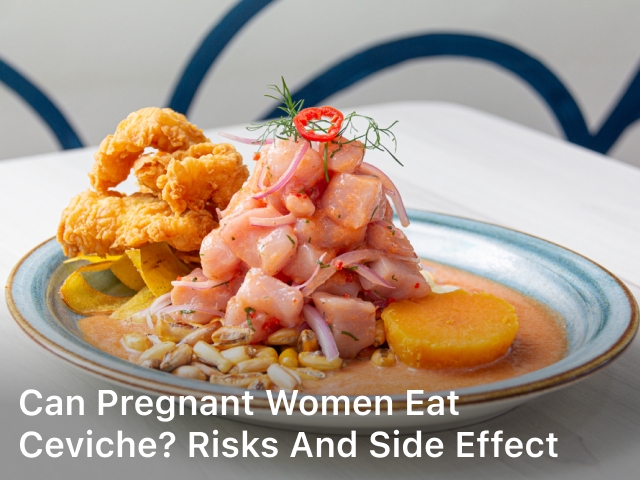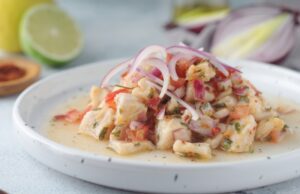Can Pregnant Women Eat Ceviche? Risks and Side Effect

nutrivitalhealth.com. Can Pregnant Women Eat Ceviche? Risks and Side Effect – Exploring the safety of consuming ceviche during pregnancy. Learn about the risks and side effects, along with expert insights and FAQs.
Pregnancy is a time of joy and anticipation, but it also comes with its share of concerns and questions. One such question that often arises is, “Can pregnant women eat ceviche?” Ceviche, a popular seafood dish, is loved for its fresh and tangy flavors. However, its preparation involves raw seafood, which raises concerns about food safety during pregnancy.
In this comprehensive guide, we will delve into the topic of whether pregnant women can safely enjoy ceviche. We’ll explore the risks and side effects associated with consuming this delectable dish during pregnancy, providing you with expert insights and answers to frequently asked questions.
Understanding Ceviche
Ceviche is a popular seafood dish enjoyed in many parts of the world. It typically consists of raw fish or seafood that is marinated in citrus juices, such as lime or lemon, along with various seasonings like onions, cilantro, and chili peppers. This marination process “cooks” the fish through the acidity of the citrus juices, giving ceviche its distinctive flavor.
Is Ceviche Safe for Pregnant Women?
Understanding the Risks
Ceviche typically consists of raw seafood, such as fish or shrimp, marinated in citrus juices like lime or lemon. While this preparation method gives ceviche its distinctive taste, it also poses certain risks, especially for expectant mothers.
1. Risk of Foodborne Illnesses
One of the primary concerns with consuming ceviche during pregnancy is the risk of foodborne illnesses. Raw seafood can contain harmful bacteria and parasites, such as Salmonella, Listeria, and Vibrio. These pathogens can lead to severe food poisoning, which can be particularly dangerous for pregnant women and their unborn babies.
2. Mercury Content
Certain types of fish commonly used in ceviche, like mackerel or swordfish, may have high levels of mercury. Mercury is a neurotoxin that can harm a developing baby’s nervous system. It’s essential to limit mercury intake during pregnancy to ensure the baby’s healthy development.
Expert Advice
To gain a more profound understanding of the risks associated with consuming ceviche during pregnancy, we reached out to Dr. Sarah Mitchell, a renowned obstetrician and gynecologist.
According to Dr. Mitchell, “Pregnant women should exercise caution when considering ceviche. The raw seafood and potential exposure to harmful bacteria make it a risky choice. It’s advisable to opt for cooked seafood options to minimize the risk of foodborne illnesses.”
Can Pregnant Women Eat Ceviche?
Alternatives to Traditional Ceviche
While traditional ceviche may not be the safest choice during pregnancy, there are alternatives that can satisfy your cravings for seafood without compromising safety.
1. Cooked Ceviche
Consider preparing a cooked version of ceviche by briefly cooking the seafood before marinating it in citrus juices. This process eliminates the risk of consuming raw seafood while retaining the dish’s flavors.
2. Vegetarian Ceviche
Vegetarian ceviche, made with ingredients like diced cucumber, tomato, and avocado, marinated in citrus juices, offers a refreshing and safe option for pregnant women.

Side Effects of Consuming Ceviche During Pregnancy
Consuming ceviche during pregnancy can lead to various side effects, which may vary from person to person. Some common side effects include:
- Nausea
- Vomiting
- Upset stomach
- Diarrhea
It’s crucial to monitor your body’s response after consuming ceviche and consult with your healthcare provider if you experience any adverse effects.
How to make ceviche safe for pregnancy?
Ceviche can be a delicious and nutritious dish, but it’s important to take certain precautions to make it safe for pregnancy, as raw seafood and acidic marinades can pose some risks. Here are steps to prepare safe ceviche during pregnancy:
- Choose Safe Seafood: Opt for cooked seafood or seafood that has been frozen to kill potential parasites and bacteria. Avoid using raw seafood like raw fish or raw shellfish in your ceviche.
- Use Cooked Seafood: Instead of raw seafood, use fully cooked seafood such as cooked shrimp, cooked crab, or cooked lobster. You can also use imitation crab if you prefer.
- Select Fresh Ingredients: Make sure all your ingredients, such as vegetables, fruits, and herbs, are fresh and have been thoroughly washed to minimize the risk of contamination.
- Avoid High-Mercury Fish: Steer clear of high-mercury fish like shark, swordfish, king mackerel, and tilefish, which can be harmful during pregnancy. Stick to lower-mercury options like shrimp, crab, or white fish.
- Marinate Safely: Instead of using traditional citrus juices like lime or lemon, which may not fully eliminate the risk of bacteria, consider using pasteurized juices or vinegar. These acids can still give your ceviche a tangy flavor without the risk of foodborne illness.
- Properly Chill Ingredients: Keep all ingredients, especially the cooked seafood, refrigerated until you’re ready to use them. Ensure your refrigerator is set to a safe temperature (below 40°F or 4°C).
- Limit Portion Size: Consume ceviche in moderation. While it can be a nutritious dish, eating large quantities can lead to excessive mercury intake.
- Serve Fresh: Prepare ceviche close to the time you plan to serve it. Do not let it sit at room temperature for extended periods.
- Store Leftovers Safely: If you have leftovers, refrigerate them promptly and consume within 1-2 days.
- Listen to Your Body: Pay attention to your body and any signs of discomfort or illness after consuming ceviche. If you experience any adverse effects, consult with your healthcare provider.
Remember that it’s essential to prioritize your health and the health of your developing baby during pregnancy. If you have any concerns or doubts about whether to include ceviche in your diet, consult with your healthcare provider for personalized advice based on your specific pregnancy and dietary needs.
Frequently Asked Questions
Q: Can ceviche made from cooked seafood be a safe option for pregnant women?
A: Yes, ceviche made from cooked seafood is a safer alternative as it eliminates the risk of consuming raw seafood.
Q: Are there specific types of fish that pregnant women should avoid in ceviche?
A: Pregnant women should avoid high-mercury fish like mackerel and swordfish in ceviche. Opt for low-mercury options like shrimp or tilapia.
Q: How can I ensure the seafood used in ceviche is safe for consumption during pregnancy?
A: Purchase seafood from reputable sources, ensure it’s properly refrigerated, and cook it thoroughly to reduce the risk of foodborne illnesses.
Q: Can vegetarian ceviche provide the same nutritional benefits as traditional ceviche?
A: Vegetarian ceviche can offer similar nutritional benefits, including vitamins and antioxidants, without the risks associated with raw seafood.
Q: Is it safe to eat ceviche during the first trimester of pregnancy?
A: It’s advisable to avoid ceviche, especially during the first trimester when the baby’s development is most critical. Opt for safer seafood options instead.
Q: What are the benefits of consuming seafood during pregnancy?
A: Seafood is a good source of essential nutrients like omega-3 fatty acids, which promote fetal brain and eye development. However, it’s crucial to choose low-mercury options and ensure proper cooking.
Conclusion
In conclusion, the question of whether pregnant women can eat ceviche is not a straightforward one. While traditional ceviche carries certain risks due to its raw seafood content, there are safer alternatives that can satisfy your cravings without compromising your health or your baby’s well-being. It’s essential to be cautious, opt for cooked seafood, and monitor any side effects when consuming ceviche during pregnancy.
Remember that your healthcare provider is your best resource for personalized advice on dietary choices during pregnancy. Prioritize your health and your baby’s safety by making informed decisions about your food choices.
